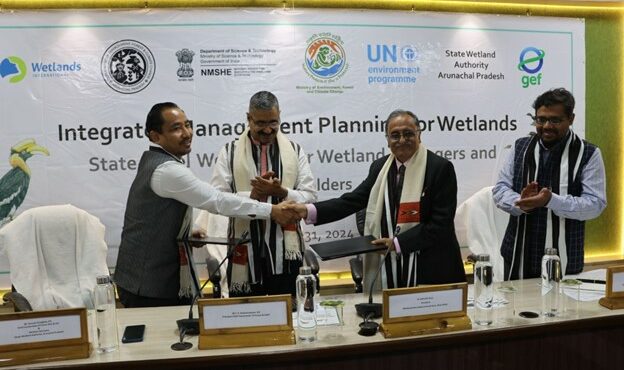
Strategic Workshop in Itanagar Focuses on Conservation and Sustainable Use of High-Altitude Wetlands in Arunachal Pradesh
-
Capacity development
-
Community resilience
-
Integrated management planning
-
Wetland values, status and trends
Wetlands International South Asia, in collaboration with the Arunachal Pradesh State Wetlands Authority, organized a two-day workshop on integrated management planning for Wetlands Conservation and Wise Use on 30th and 31st July 2024 at the Dorjee Khandu Convention Centre in Itanagar.
The workshop, attended by around thirty-six wetland managers and stakeholders, including representatives of research organizations like the Zoological Survey of India, Botanical Survey of India, and GB Pant NERC, featured addresses from Shri P Subramanyam, Principal Chief Conservator of Forests; Shri Samuel Changkija, Member Secretary of the State Wetland Authority; and Dr. Sidharth Kaul, President of Wetlands International South Asia. Shri Samuel highlighted the importance of sustainable wetland use and discussed the management of seven proposed wetlands in Arunachal Pradesh.

Dr. Kaul emphasized the ecosystem services of high-altitude wetlands and the threats they face. At the same time, Shri P Subramanyam stressed the need for an Integrated Management Plan that includes community input. The signing of a Memorandum of Understanding (MoU) between the two organizations underscored their commitment to wetlands conservation.

The first technical session of the workshop addressed key challenges, including pollution at Sipit Lake, encroachment at Preetnagar Lake, and classification issues with the Mehao cluster of lakes, while highlighting the need for improved accessibility at Glaw Lake. Shri Samuel suggested categorizing wetlands by altitude and accessibility and establishing specific visitor protocols. Dr Kaul’s session focused on integrated wetlands management principles, the ecosystem services of high-altitude wetlands, and the integration of wetlands into education. Shri D. Dohu Robin recommended incorporating project case studies for improved learning. Shri Arghya Chakrabarty emphasized understanding wetlands as open ecosystems, their features, and necessary management interventions.

On the second day, Dr Ritesh Kumar conducted an interactive Q&A on wildlife disease detection and societal roles, alongside training on Wetland Management Planning and Monitoring with a focus on SMART objectives. He also led a practical session on the ‘Implementation of Wetlands (Conservation and Management) Rules, 2017,’ outlining the rules’ origins, wetlands types, and notification procedures.
The workshop concluded with a visit to Ganga Lake, where participants conducted water and soil sampling and observed local biodiversity. An evening herpetofauna survey documented species, including Cope’s Assam Frog, Indian softshell turtle, keeled box turtle, and terai tree frog.
